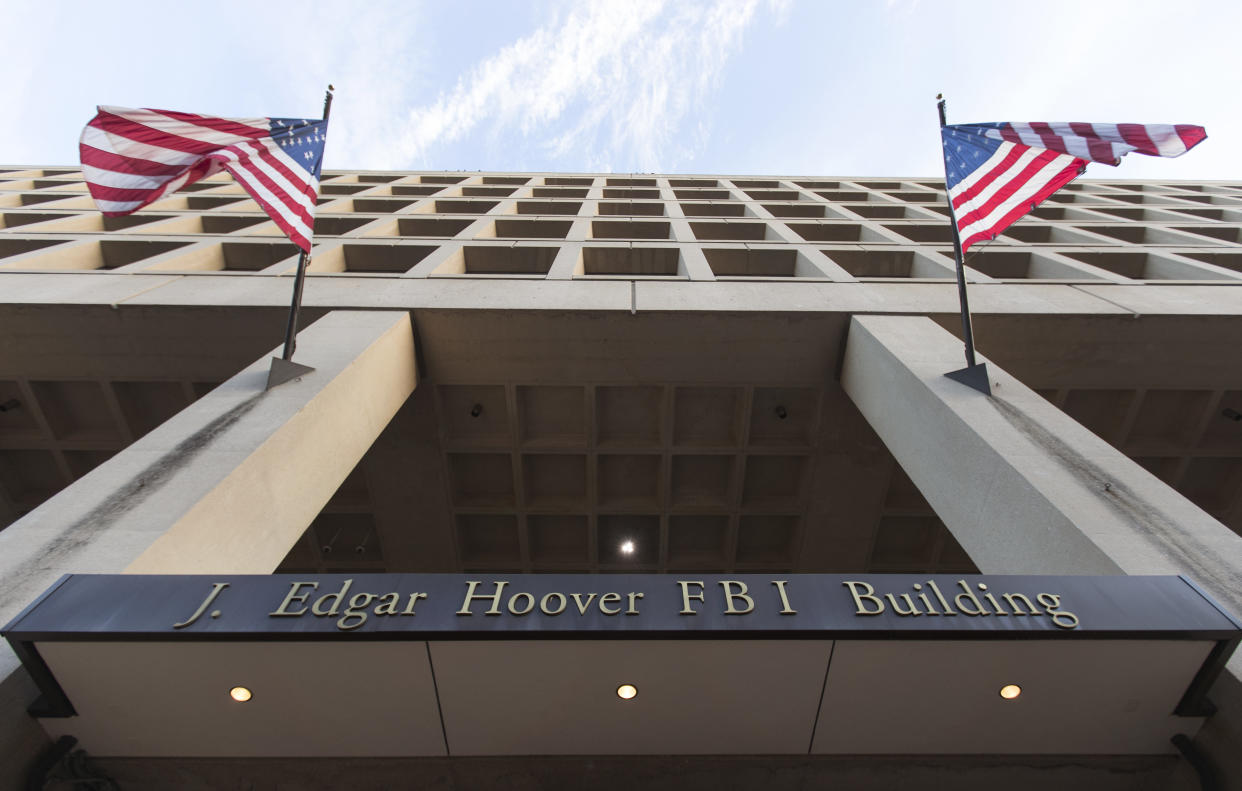FBI Sees 'Significant' Rise In White Supremacist Domestic Terror Threat

WASHINGTON ― A senior FBI counterterrorism official said this week that current federal law makes bringing domestic terrorism cases “challenging” for the bureau as it works to combat a “significant” rise in instances of white supremacist violence.
Domestic terrorism arrests continue to outpace arrests for international terrorism, despite the fact that U.S. law makes it much easier to charge defendants who associate themselves with designated foreign terrorist organizations like ISIS and al Qaeda, the senior FBI counterterrorism official, who asked to be unnamed, told reporters at a briefing on Thursday.
Between October and March, the FBI tracked 66 domestic terrorism arrests compared with 63 international terrorism arrests. But given that federal authorities have a more limited range of criminal charges they can bring against domestic extremists before they’ve actually gone through with a violent act, the official said about half of the domestic terrorism suspects they tracked were arrested by state and local authorities instead of facing federal charges. The FBI tracked 150 domestic terrorism arrests in the 2017 fiscal year and 120 domestic terrorisms arrests in the 2018 fiscal year, and the 2019 numbers are on track to land in that range.
The FBI official said the bureau has seen a significant increase in white supremacist domestic terrorism investigations since the fall. The number of arrests of racially motivated violent extremists has gone up about 30% to 40% from the last fiscal year, the official said, though the bureau did not provide precise figures. The bureau has about 850 ongoing domestic terrorism investigations and nearly 5,000 ongoing terrorism probes in total.
The domestic terrorism threat has evolved, the official said, away from large conspiracies and toward lone offenders, which makes the threats more insular and more difficult to detect. Just as in the foreign terrorism space, the official said, domestic terrorists are being radicalized online.
“Terrorism moves at the speed of social media,” the official said. “The flash to bang has become even shorter.”
The FBI currently organizes domestic terrorism cases into four categories: racially motivated violent extremism; anti-government and anti-authority extremism; animal rights and environmental extremism; and abortion extremism.
Federal authorities have brought several high-profile domestic terrorism-related cases since the fall. The feds unsealed charges against four white supremacists involved in violence in Charlottesville, charged Trump fanatic Cesar Sayoc with mailing bombs to Democrats, charged a white supremacist who shot up a Pittsburgh synagogue, charged a Coast Guard lieutenant they say plotted to kill Democrats and reporters and charged a white supremacist who discussed copying the anti-Muslim terrorist attack in New Zealand. And a trio of racist militiamen who were caught in an FBI sting as they plotted during the 2016 presidential campaign to bomb a community of Muslim refugees in Kansas were sentenced to decades behind bars earlier this year.
But the lack of a federal domestic terrorism statute has posed challenges for law enforcement in cases where a defendant has yet to go through with an attack. Often they’ll charge potential domestic terrorists with other crimes ― sometimes a charge involving guns or drugs or lying to the FBI ― to take a target into custody and end the threat.
“It may not be evident in the face of the crime or whose involved working it that it’s a domestic terrorism suspect who was arrested,” the FBI official said. “We use anything [in federal law] we can that fits, that’s appropriate.”
Thomas Alonzo Bolin, who the feds say discussed killing Muslims with his cousin, was charged with lying to the FBI about a weapon he displayed on social media and recently reached a plea deal that could give him a short prison sentence or probation. Christopher Hasson, the Coast Guard lieutenant the feds said was plotting to “murder innocent civilians on a scale rarely seen in this country,” is only facing gun and drug charges, and a federal magistrate judge even granted him bail (though that decision was ultimately overruled).
The FBI Agents Association, an outside organization that represents more than 14,000 current and former FBI special agents, is pushing Congress to pass a federal domestic terrorism law, an effort that has gathered support from several former national security officials.
A Justice Department official told Rep. Michael McCaul (R-Texas) at a hearing earlier this month that the department was open to having a discussion with Congress about a new domestic terrorism law. Brad Wiegmann of DOJ’s National Security Division said it would be “highly problematic” for the government to designate domestic terrorism groups, but said a new law analogous to federal hate crime laws might be a better approach.
The FBI official told journalists this week that the bureau would “welcome the opportunity” to use additional authorities to charge domestic terrorists if Congress were to pass such legislation.
“These are challenging cases,” the official said. “We’ll do drug charges or gun charges on some of these cases ... to disrupt prior to attack.”
Related Coverage
There's A Good Reason Feds Don't Call White Guys Terrorists, Says DOJ Domestic Terror Chief
FBI Agents And The Internet Agree: The Feds Should Call Terrorism What It Is
Americans Are Surprised Domestic Terrorism Isn’t A Federal Crime. Most Think It Should Be.
The Fight Over Treating Neo-Nazi Terrorists Differently From Muslim Ones
Love HuffPost? Become a founding member of HuffPost Plus today.
This article originally appeared on HuffPost.

